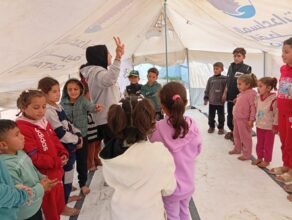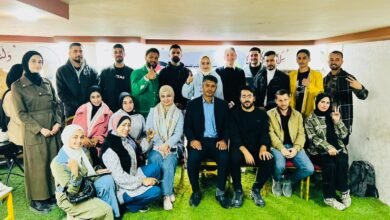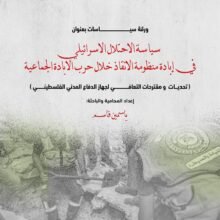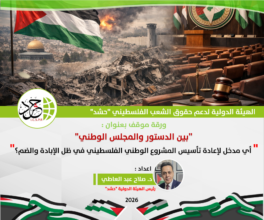
The International Commission (ICSPR) Sends a Comprehensive Briefing Note on the Crime of Deliberate Thirst and Starvation Against the Population of the Gaza Strip, Urging UN and International Bodies to Fulfill Their Legal Responsibilities
Date: April 8, 2025
Press Release
The International Commission (ICSPR) Sends a Comprehensive Briefing Note on the Crime of Deliberate Thirst and Starvation Against the Population of the Gaza Strip, Urging UN and International Bodies to Fulfill Their Legal Responsibilities
The International Commission to Support Palestinian Rights (ICSPR) has send an urgent legal and humanitarian briefing memo highlighting one of the most horrific ongoing crimes committed by the Israeli occupation against more than two million people in the Gaza Strip: the deliberate and systematic policy of starvation and thirst, which falls under collective punishment and genocide as prohibited by international law.
This memo comes amid the ongoing Israeli aggression against the Gaza Strip since October 7, 2023. ICSPR has documented Israel’s deliberate use of food and water as weapons of war to exterminate and starve the civilian population, through a series of unlawful measures. These include the complete closure of all crossings, the prevention of humanitarian aid—including food and medicine—from entering, the restriction of fuel needed to operate water and sewage networks, as well as the targeting of bakeries, food storage facilities, and water tanks. These acts have resulted in an unprecedented humanitarian catastrophe threatening the lives of hundreds of thousands of children, women, patients, and the elderly.
Accordingly, ICSPR has addressed this briefing memo to a wide range of international bodies, foremost among them: the United Nations Secretary-General, members of the UN Security Council and General Assembly, the UN High Commissioner for Human Rights, the UN Human Rights Council, the UN Commission of Inquiry on the Occupied Palestinian Territory, the International Court of Justice, the Prosecutor of the International Criminal Court, the UN Special Rapporteur on the situation of human rights in the Palestinian territories occupied since 1967, and the UN Office for the Coordination of Humanitarian Affairs (OCHA). It also reached specialized agencies such as the Food and Agriculture Organization (FAO), the United Nations Children’s Fund (UNICEF), the World Water Council (WWC), the International Water and Sanitation Centre (IRC), and Save the Children.
The memo emphasizes that these practices constitute a flagrant violation of international humanitarian law, particularly the Fourth Geneva Convention, which obligates the occupying power to ensure the provision of basic necessities—including food, water, and medicine—to civilians under occupation. ICSPR further asserts that Israel’s use of starvation and thirst as weapons of war amounts to a crime against humanity under the Rome Statute of the International Criminal Court, and a genocide under the 1948 Convention on the Prevention and Punishment of the Crime of Genocide.
Systematic Starvation in Gaza: A Man-Made Humanitarian Catastrophe
Gaza is witnessing one of the worst humanitarian disasters in modern history due to Israel’s systematic starvation policy. By closing all crossings and preventing the entry of food, medicine, and fuel, Israel has turned the Strip into a giant prison suffering from catastrophic famine. Moreover, it has deliberately targeted 26 charitable soup kitchens and 37 aid distribution centers, resulting in the killing of 743 relief workers, including international staff. The cruelty of this policy was epitomized in the “Flour Massacre” on Al-Rasheed Street, which left 110 civilians—mostly women and children—dead while waiting for their daily bread.
These actions have led to the complete collapse of Gaza’s food system. All bakeries (100%) have ceased operations due to the blockade on fuel and flour. While the Strip requires 450 tons of flour daily, the incoming aid covers less than 10% of this need. As a result, 495,000 people have reached Phase 5 (catastrophic famine), including 557,000 women and 60,000 children suffering from acute malnutrition. The crisis peaked with the death of 52 individuals from hunger, many of them children. Civilians have been forced to eat grass and animal feed just to survive.
Crossing Closures as a Tool of Collective Punishment
Israel’s closure of border crossings is one of the main tools of collective punishment against Gaza’s population. Despite the ceasefire agreement in January 2025, which stipulated the entry of 15,000 aid trucks and 1,250 fuel trucks, Israel failed to uphold its obligations. This policy has caused the unemployment rate to skyrocket to 90%, while the commission on transferring money into Gaza reached 40%. These factors have exacerbated the suffering of the population, who now rely almost entirely on the scarce humanitarian aid that makes it through.
Deliberate Thirst: A War on Basic Human Survival
Israel is also waging a deliberate campaign to deprive Gaza’s population of water by destroying critical water infrastructure. It has destroyed 80% of water wells in Beit Lahia, and denied 40% of the population access to drinkable water. The daily water share per individual has plummeted from 86 liters to just 3–12 liters—far below the internationally recommended minimum of 100 liters per day. Reports indicate that 96% of Gaza’s water is now contaminated and unfit for consumption according to WHO standards.
Disease Outbreaks: The Deadly Impact of Water Deprivation
The worsening water crisis has triggered widespread disease and epidemics. Around 66% of the population suffers from waterborne illnesses. Statistics record over 500,000 cases of watery diarrhea and 71,338 cases of hepatitis. Additionally, one million cases of respiratory infections have been reported. After a 25-year absence, polio has returned to Gaza, prompting an emergency vaccination campaign targeting 559,161 children. Serious skin diseases have also emerged, including 100,000 cases of scabies and 60,000 cases of skin rash—further compounding the public health disaster amidst the complete collapse of the healthcare system.
These deliberate policies represent a grave violation of international humanitarian law and demand immediate action from the international community to preserve what remains of life in Gaza.
ICSPR stressed in its memo that international silence in the face of these crimes amounts to implicit complicity with the perpetrators. It called upon the international community to fulfill its legal and moral obligations by acting swiftly and decisively to stop Israel’s crimes against Palestinian civilians. ICSPR urged for the immediate opening of all crossings, the urgent entry of essential supplies including food, water, and medicine, the provision of international protection for civilians, and the prosecution of Israeli leaders before international courts for their war crimes.
ICSPR hopes that this memo will help prompt an urgent and responsible response from international bodies to end the use of starvation and thirst as weapons of war against Gaza’s population, and to halt the genocide that continues to unfold amid a global silence and absence of justice.





